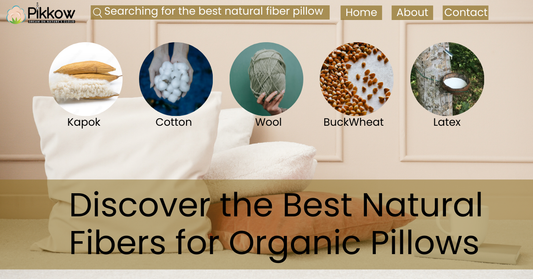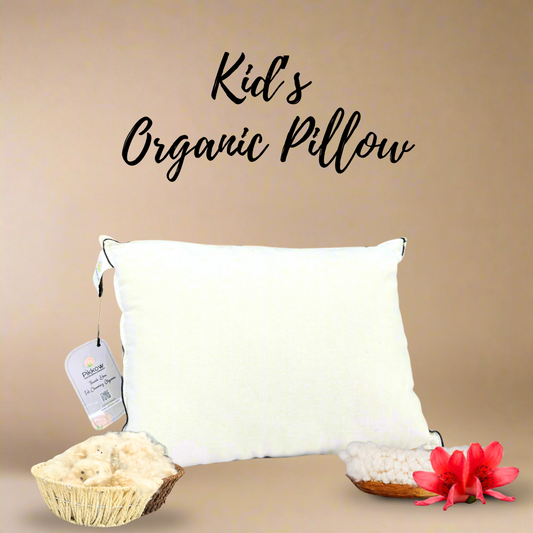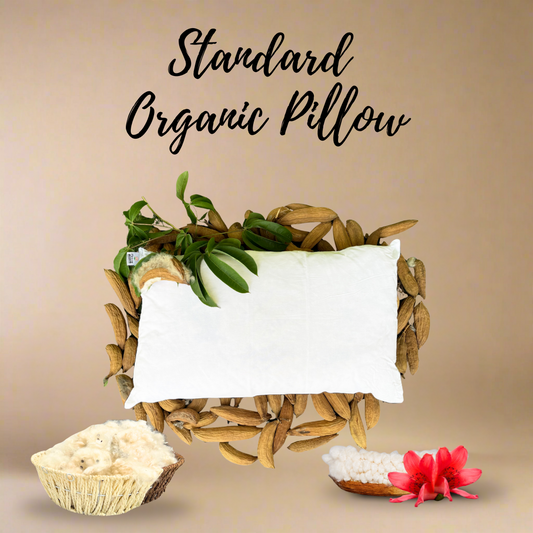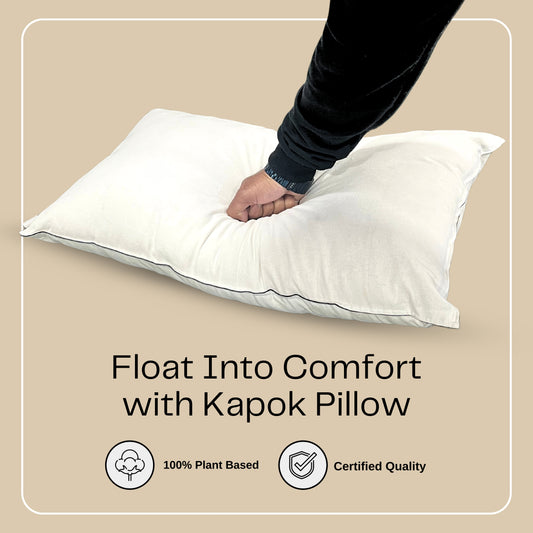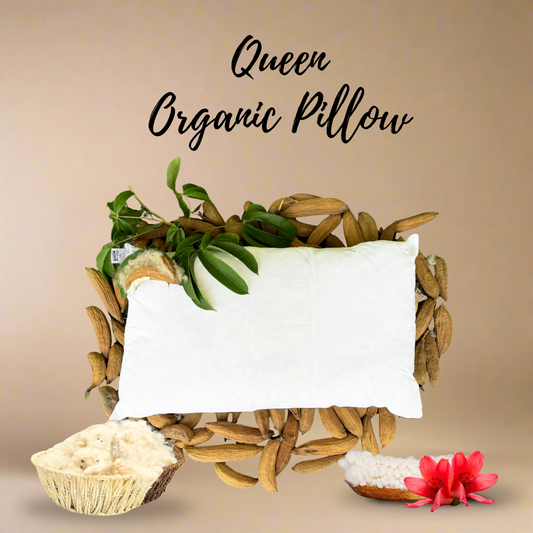Choosing the right pillow can be a game-changer for your sleep quality. Whether you’re a side sleeper looking for neck support or a stomach sleeper seeking comfort, your choice of pillow firmness significantly impacts spinal alignment, comfort, and overall well-being. This comprehensive firm vs soft organic pillow guide will help you make an informed decision based on your unique sleep style, health needs, and sustainability preferences.
In this blog, we’ll explore the key differences between firm organic pillows and soft organic pillows, evaluate their benefits, and dive into essential pillow firmness comparisons to help you choose the right organic pillow with confidence.
Understanding Organic Pillow Support Level

Before comparing firmness, it’s important to understand why organic pillows are preferred by health-conscious and eco-friendly consumers. Made from materials like natural latex, organic wool, kapok, and organic cotton, these pillows are free from synthetic chemicals and provide excellent head and neck pillow support without compromising on sustainability.
Organic pillows also offer various natural pillow firmness options—from ultra-soft to extra firm—depending on the material composition and fill density.
Soft Organic Pillows: Comfort with a Gentle Touch
A soft organic pillow typically uses shredded latex, kapok, or organic cotton. It molds gently to the contours of your head and neck, offering a cloud-like sleep experience.
Benefits of Soft Pillows:
-
Gentle pressure-relief pillow options for sensitive sleepers
-
Ideal for stomach sleepers and back sleepers
-
Excellent for people who prefer a low-profile pillow
- Provides personalized pillow comfort due to its moldability
Soft pillows are particularly helpful for individuals who toss and turn at night or experience shoulder pain. A good example is a kapok pillow, known for its plush feel and hypoallergenic nature. However, keep in mind that the softness may compromise long-term structure if not maintained.
Firm Organic Pillows: Structured Support and Longevity
In contrast, a firm organic pillow provides solid support using denser materials like natural latex blocks, buckwheat hulls, or layered wool. These materials help maintain proper posture and spinal alignment.
Benefits of Firm Pillows:
-
Promotes spine alignment and pillow firmness consistency
-
Ideal for side sleepers or those needing extra neck support
-
Longer lasting due to higher pillow density for deep sleep
- Reduces pressure buildup in shoulders and cervical spine
- If you're seeking cervical pillow support options, a firm pillow is generally the best choice. It ensures your neck doesn't sink too low and keeps your spine in a neutral position.
Pillow Firmness Comparison: Sleep Style Matters Most
So, which pillow is better for side sleepers? Which works best for back or stomach sleepers? Here’s a breakdown using our firm vs soft organic pillow guide:
Sleep Position |
Recommended Firmness |
Why It Works |
|
Side Sleepers |
Firm Organic Pillow |
Maintains spine alignment and fills shoulder gap |
|
Back Sleepers |
Medium to Firm |
Supports neck curve without lifting the head too high |
|
Stomach Sleepers |
Soft Organic Pillow |
Prevents neck strain by allowing the head to lie flatter |
|
Combination Sleepers |
Adjustable Organic Pillow |
Customizable fill works for varying sleep positions |
Understanding your sleeping position and pillow type helps narrow down the best choice tailored to your needs.
Choosing the Right Organic Pillow: What to Consider
Here’s what to keep in mind while shopping for the ideal pillow:
1. Material Type
Kapok pillow firmness:
Kapok pillow firmness is soft and fluffy, perfect for comfort-seekers.
Latex vs kapok pillow firmness:
Latex is firmer and more supportive; kapok is softer and more pliable.
2. Fill Density
More fill equals more firmness. Choose a pillow with adjustable fill so you can personalize your comfort level as needed.
3. Sleeping Conditions
Hot sleepers may prefer breathable materials like organic wool or shredded latex that allow airflow.
4. Pillow Shape and Ergonomics
Contoured or cervical shapes offer better sleep ergonomics and pillow firmness for back and side sleepers, ensuring proper alignment.
5. Sustainability Goals
Look for eco-friendly firm pillows made from renewable, biodegradable materials. Brands offering sustainable firm pillow materials align well with green living.
Firm vs Soft Organic Pillow Guide: Pros & Cons Summary
Let’s summarize both options in the context of this guide:
|
Features |
Soft Organic Pillow |
Firm Organic Pillow |
|
Comfort Level |
Plush, gentle, low resistance |
High support, structured feel |
|
Best For |
Stomach/back sleepers |
Side sleepers, neck/back pain sufferers |
|
Adjustability |
High (especially in kapok pillows) |
Moderate to High (in shredded latex designs) |
|
Durability |
Moderate (flattens over time) |
High (maintains shape longer) |
|
Health Benefits |
Great for pressure relief |
Excellent for alignment and neck support |
Use this firm vs soft organic pillow guide as a reference for selecting based on your body’s needs and comfort preferences.
Final Thoughts: Your Personalized Pillow Comfort Starts Here
Your pillow is not just a sleep accessory—it’s a health investment. By understanding your body, sleep style, and comfort preferences, you can confidently navigate the firm vs soft organic pillow guide and find your perfect fit.
Whether you prioritize the benefits of soft pillows or need the benefits of firm pillows for therapeutic support, today’s organic pillow market offers a wealth of options to suit your needs.
Sleep deeper, feel better, and live healthier—one eco-conscious pillow at a time.
FAQs: Firm vs Soft Organic Pillow Guide
Q1: How do I know which pillow firmness is right for me?
Your sleeping position is the best indicator. Side sleepers benefit from firm support, while stomach sleepers need a softer pillow. If you often switch positions, opt for an adjustable organic pillow.
Q2: Are firm organic pillows better for neck pain?
Yes. A firm organic pillow helps maintain head and neck pillow support, reducing strain and promoting spinal alignment—making it the best pillow for neck support.
Q3: Can soft pillows be supportive?
Yes, especially if they use high-quality materials like kapok or shredded latex. These offer organic soft pillow for comfort while still providing moderate support.
Q4: What are the best organic pillow buying tips?
Choose a pillow with certified organic materials, customizable firmness, and breathable fabrics. Always consider pillow density for deep sleep and check if the pillow suits your pressure points and posture.
Q5: Is there a standard firmness guide for organic bedding?
While firmness varies by brand, most offer a scale from soft to firm. Use this firmness guide for organic bedding as a benchmark and look for pillows with adjustable fill for versatility.




